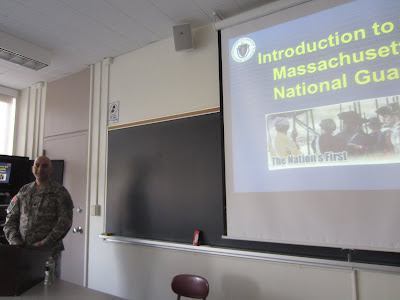As the semester draws to a close, as well as the academic year, I would like to take this opportunity to publicly thank the wonderful guest speakers in my Humanitarian Logistics and Healthcare class this semester. In a class such as this, the students learn a tremendous amount from practitioners and, even more so, given their immense challenges because of the COVID-19 pandemic.
On February 18, 2021, we had the honor of hearing from Mr. Tim Pitoniak, who is a Regional Disaster Program Officer for the American Red Cross (ARC) in Massachusetts. Mr. Pitoniak spent the first 10 years of his Red Cross career in Greater New York where his focus was staffing, training, and partnerships. He assumed his position in Massachusetts in 2015 and has been the job director for multiple large operations, including the 2018 Lawrence gas explosion. He has regularly been deployed to national jobs, working in leadership roles for disasters all over the continental U.S. and Puerto Rico. Mr. Pitoniak shared with us the challenges the Red Cross has faced in the pandemic and how it has been able to provide certain support services virtually, because of the need for social distancing. The students were amazed by the number of volunteers associated with the ARC and also how they are constantly adapting to provide a wide range of services, and not only to disaster victims.
On March 2, 2021, we were honored to have Dr. George Karagiannis Zoom in all the way from Athens, Greece for his guest lecture. Dr. Karagiannis is Greece's Deputy Secretary-General for Civil Protection, the US equivalent of Deputy FEMA Administrator. From 2016 to 2019, he was a Technical Officer at the European Commission Joint Research Center, where his area of expertise revolved around emergency management, critical infrastructure protection, and hybrid threats. Prior to joining the Joint Research Center, he was a Disaster Management Consultant. The title of his guest lecture was, "Humanitarian Needs Assessment & Information Management." So many of the insights provided by Dr. Karagiannis resonated with the students, including his emphasis on the use of technology and even AI for needs assessment. And he also told the class that, despite what you see on TV and in the movies, one rarely gains much information from helicopter rides over disaster areas. Additional information and discussion during his great talk can be found on my blogpost here.
I am delighted that Dr. Karagiannis has accepted our invitation to be a plenary speaker at the next Dynamics of Disasters conference that I am, again, co-organizing with Professors Kotsireas and Pardalos, but this time it will be virtual. More information can be accessed here with additional information being posted in the coming weeks.
On March 11, 2021, the students and I were thrilled to have Ms, Dawn Brantley present to the class. She is the Assistant Director for Planning and Preparedness for MEMA (Massachusetts Emergency Management Agency) and was responsible for establishing a program of COVID Isolation Hotels, which was also the topic of her presentation. The subtitle of it (and this spoke volumes) was: "building a plane while you fly it." Her presentation was absolutely mesmerizing. The initiative was made operational in 7 days and the logistics behind it were incredible, with so many issues such as food provision, laundry services, nursing care, and so much more needed. And to accomplish so much with attention having to be paid to COVID protocols. It was not easy getting certain hotels "on board," especially with some local communities not being supportive.
The dedication of Ms. Brantley to this important enterprise and that of her team were truly inspiring! The ARC had also been assisting in this endeavor so there was some nice synergy with Mr. Pitoniak's guest lecture. March 11, 2021, the day of Ms. Brantley's presentation, was the one year anniversary of the World Health Organization declaring the COVID-19 pandemic!
I cannot thank all the speakers sufficiently - they were fighting the pandemic on the front lines and still made time to help in the education of students. They left a lasting impact and were part of a transformative educational experience. Each was presented with a special letter that I wrote as well as a certificate signed by our great Dean Anne P. Massey in appreciation.
On March 23, 2021, we had the Nursing Director Team from Cooley Dickinson Hospital present to my class. The title of the panel presentation was, "Cooley Dickinson Hospital: A Year of COVID: Readiness, Response and Resilience." There were 8 speakers who shared with us their incredible work in transforming parts of the hospital to be able to handle more COVID patients and how personnel were retrained and needed PPEs acquired.
No healthcare worker contracted COVID, which is, frankly, remarkable and such a relief. I wrote an earlier blogpost on the nursing team and sent my thank you letter to the Interim Director of Cooley Dickinson Hospital, Dr. Brown, who responded so quickly. Some of the lessons learned included the importance of communications and appreciating the workers' fatigue and challenges.
The team also shared a video with us and there was not a dry eye in the audience. I would like to, again, thank the incredible panelists: Angela Belmont, VP, Patient Care Services & Chief Nursing Officer, Lynn M. Grondin, Director of Nursing for Perioperative and CVIR Services, Mike Netta, Director of Operations for Perioperative and CVIR Services, Alexandra Penzias, Director of Nursing and Professional Practice Education, Sara C. McKeown, Nurse Director, Emergency Department, Ann LeBrun, Nursing Director, Critical Care Services, Margaret-Ann Azzaro, Director, Medical Surgical & Childbirth Services, Jacquelyn Ouellette, Director, Behavioral Unit.





































